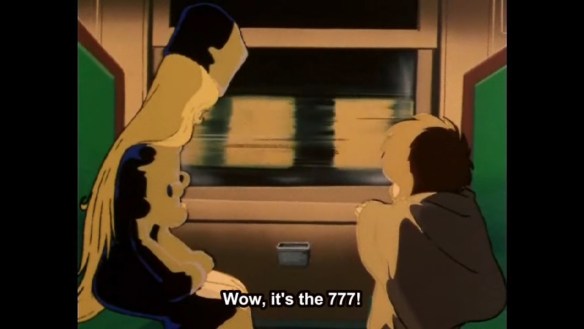Hello folks, and welcome back to Wrong Every Time. Today I’m delighted to announce we’re returning to Galaxy Express 999, as Tetsuro and Maetel continue their journey toward the far reaches of the galaxy. When last we left off, they had just departed from the planet Trader, having seen firsthand the vast disparities inherent in their allegedly glorious future. The rails of the Galaxy Express are greased by blood, facilitated by a sprawling underclass that can only dream of the freedom and mobility Tetsuro enjoys.
But of course, that has been an assumption of Galaxy Express from the very first episode, when we were immediately introduced to the undercity attending its glittering surface. Rather than simply wallow in the reality of capitalism, our last two-parter instead told a quiet, personal story, as we joined Hanako on her “triumphant” return to her parents’ home. Having worked herself to the bone without acquiring either wealth or love, she was granted a chance by Tetsuro to at least calm her parents’ worries, offering a misleading but kindly meant assurance that her years of toil and absence were worth something. They can strip us of everything else, but they cannot steal our concern for each other, our tenderness towards our loved ones or our dreams of escaping this life.
Could that really be enough? At least in celebrating this small act of kindness, Galaxy Express demonstrates that we are not so alone, that we all suffer under the yoke of capitalism, but that in our dreams and compassion, we are one and the same. Let us hold tight to that hope in these dark times, doing right by each other and working towards a brighter future. Once more, all aboard the Galaxy Express.
Episode 11
“Formless Planet Nuruba,” a title offering a promise nearly as enticing as “the graveyard at the bottom of gravity.” Beyond its character studies and political dimensions, Galaxy Express constantly delights through Leiji Matsumoto’s fanciful interpretations of space travel. Grounded “hard” scifi doesn’t tend to appeal to me very much; I’m more of a fantasy guy, and thus I absolutely adore Matsumoto’s playful, inventive riffs on what it means to travel through space, which share significant DNA with Night on the Galactic Railroad’s dreamlike, philosophical approach. His mind is unbound by pragmatic concerns regarding what seems scientifically feasible; he lets his imagination run wild, and Matsumoto clearly possesses a singularly inexhaustible imagination
The 777 passes by our train along its own space-rails. Very nice effects used to convey the sensation of trains passing in the night here, with the heavy glow of the 777 casting warping shadows across our pair, and the train itself being conveyed through smeared, distorted rectangles of light. The end result is an ambiguous feeling of solidarity, like seeing city lights on a distant hill; you know there are people hidden beyond those lights, but they are utterly obscure to you, leaving you only to hope that they are similarly staring through those windows and wondering at the strangers beyond
It’s honestly quite a nice feeling. I feel similarly about strangers as I do about blizzards; they’ve lovely things to watch through a sturdy, secure window
Apparently Nuruba is an unscheduled stop, made at a passenger’s request. They’ll be there for fourteen hours
“Nobody’s ever seen the entire universe.” It feels like that is much of the appeal of space to Matsumoto – it is an uncharted frontier, meaning the possibilities hiding in its far reaches are limitless. It also raises the idea that the whole of reality is unknowable to any one person, that there are limitations to every single perspective
“Nuruba is famous for being a place where humans come to drown themselves.” And of course, when you combine that fantastical whimsy with Matsumoto’s weighted understanding of human nature, you end up with perhaps my favorite possible tonal contrast, the “hope in the face of apocalypse” synthesis of Girls’ Last Tour or Haibane Renmei
Watching this show is making me realize how little Yuasa had to adjust from his influences in constructing something like Kaiba; both the playfulness and the harrowing social commentary are all right here
Nuruba is represented as something like an amoeba, a great green shape devoid of harsh angles
The orchestral accompaniment does an excellent job of conveying a sense of wonder and discovery as we land, offering gently rising strings that sound like the first light of morning
Seems even the locals here are basically amoebas, as demonstrated by this pair of child-amoebas named Suru and Tsuru racing away from their father
The train actually comes to a stop just a few feet above Nuruba’s undulating terrain
“It makes me feel all fuzzy when I think I could be a human!” Like many of our prior episodic visitors, these amoebas’ greatest wish is to achieve the freedom Tetsuro enjoys
“I’ll eat a lot and sleep.” “It looks like you could survive no matter where you go.” Maetel finds Tetsuro’s simplicity endearing, and likely enviable as well – she can only imagine being so free of larger concerns, that her checklist of responsibilities might begin and end with eating and sleeping
It seems we’ll also be reprising the doppelganger plot from the library episode; these organisms seek to claim Maetel and Tetsuro’s forms, and thus also their enviable positions on the train. Interesting variation on a Dezakian postcard memory shot for this amoeba attacking Maetel, always a handy trick for avoiding difficult-to-animate sequences
In spite of the limited animation, these cuts do a fine job of demonstrating how Maetel has either been replaced or taken over by the amoeba, which isn’t able to replicate the grace of her normal movements
Maetel does not respond to Tetsuro’s questions, and he is soon jumped by the second amoeba
I like how the conductor’s body just collapses into his suit when he’s “asleep,” emphasizing how he doesn’t actually have a form, just a black void that occasionally fills out the limbs of his uniform
The conductor passes a pair of young lovers that prompt a brief pause, before eventually reaching Tetsuro and Maetel. However, now neither of them will speak
Ah, it seems the amoebas have merely copied their forms and stolen their clothes, as revealed through a naked and extremely angry Tetsuro stomping down the aisle
Actually lots of energetic animation here, as Tetsuro’s rush to his doppelganger is realized in fluid detail, and his attack on his enemy’s face embraces the inherent stretchiness of their amoeba form
The expression work on not-Maetel is also oddly compelling; she looks bashful and uncertain, her hair draped loosely across her arm, all of which contrasts harshly against the consistency and absolute confidence of Maetel’s usual affectation
I say, just before we find the actual Maetel locked naked in the bathroom
You still can’t take Maetel’s dignity, though. She appears as confident as ever as she explains the situation to the conductor
Maetel’s doppelganger fails to maintain its form, melting back into pink goo
The amoebas’ father fails in leaping to the train, lamenting how he used to be able to climb up in a single bound. Even for these creatures, time is a harsh mistress, rapidly stealing their capacity for reinvention or ascension in the same way it betrayed Hanako’s ambitions
Tetsuro is determined to punish the doppelgangers “for the sake of future travelers,” while Maetel urges him to be forgiving. His heart is generally in the right place, but he still lacks Maetel’s understanding of desperation in a general sense; like many people, he has difficulty extrapolating from the individual sympathetic stories of the lost souls he knows personally to a theory of society at large, and thereby understanding from the start the pressures that would lead these two creatures to desperately feign humanity
The lack of this faculty might well doom humanity at large; there are enough people who cannot extend their empathy beyond the people immediately associated with them to propel reactionary philosophy to the world stage. A lack of empathetic imagination could easily be what ends our species’ current era – a moral deficiency that conservatives seem oddly proud of, given how frequently they parade that “I cannot understand that people distant from me also deserve human rights” heat map
The amoeba father arrives and apologizes for his children. “Maybe things have changed… we never used to feel envious of living things that had form”
“Things with shapes eventually get old and become ugly.” The father proposes a variation on the philosophy that inspires the search for a mechanical body
And Tetsuro thinks back to the tragic Shadow, who gave up her precious, temporary human body and lived to regret it. At last, he is beginning to see the value of a fragile human form
“Because we have no form, we are not considered beautiful or ugly, nor discriminated against.” They simply exist outside of the concerns of those whose passions are tethered to their physical form
“Even if humans buy a mechanical body, they will never break or be ugly.” Nonetheless, Tetsuro is still committed to his own philosophy, seeing the answer to this formless father’s question in the security of a mechanical body
The father recognizes Maetel as possessing a mechanical body, but chooses to keep her secret. Nonetheless, Tetsuro is beginning to realize there’s something special about Maetel, something no one is telling him
And by the end, Tetsuro can see these distinct organisms as much like himself, reflecting on happy moments with his own father. Even those without a far-reaching moral imagination can learn to understand those unlike themselves, so long as they actually meet and interact with them
Interesting how this episode is associating “formlessness” with “non-existence,” seeing in the lack of a tangible form a kind of death. I suppose it’s appropriate for a show so focused on the significance of a human body, wherein the surrender of your mortality in favor of an unchanging metal body is often also framed as a kind of death, like sentencing yourself to a permanent emotional purgatory
As their train departs, the two lovers leap from the windows, determined to preserve their love in its purest, most beautiful form. Is preserving one perfect moment really so enticing, that you would throw away everything which follows?
And Done
In true Galaxy Express fashion, our episode began with a philosophical question and concluded with a romantic suicide pact, as two young souls who could not bear the idea of aging into decrepit forms instead chose to preserve their passion through the finality of death. Would mechanical bodies have made them happy, or would they pine for their old forms, realizing over time the opportunities they had lost? It is impossible to say; though Tetsuro came to sympathize with this episode’s formless children, he cannot truly understand them, cannot see the world from their perspective, and know the hunger that prompts them to abandon their own fluid nature. Was their father correct in his resignation to formlessness, or merely seeking peace with the inevitable? All we can know is that those who have found a stable, eternal form via robotics are no happier for it; perhaps it is only in the brief fulfillment of such an eternity that joy is found, in the giddy flight from the Galaxy Express’ windows to the unyielding ground below.
This article was made possible by reader support. Thank you all for all that you do.




